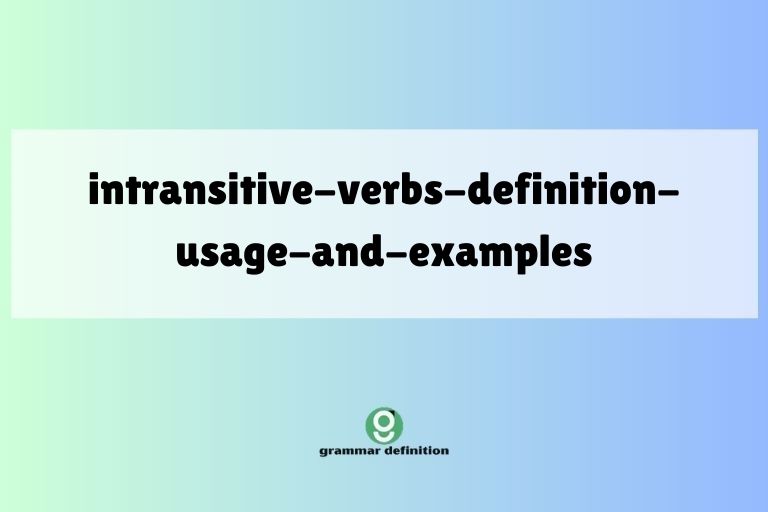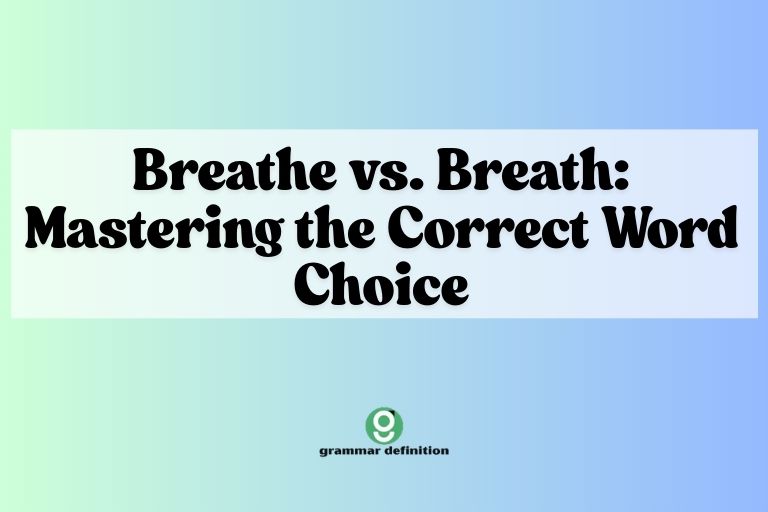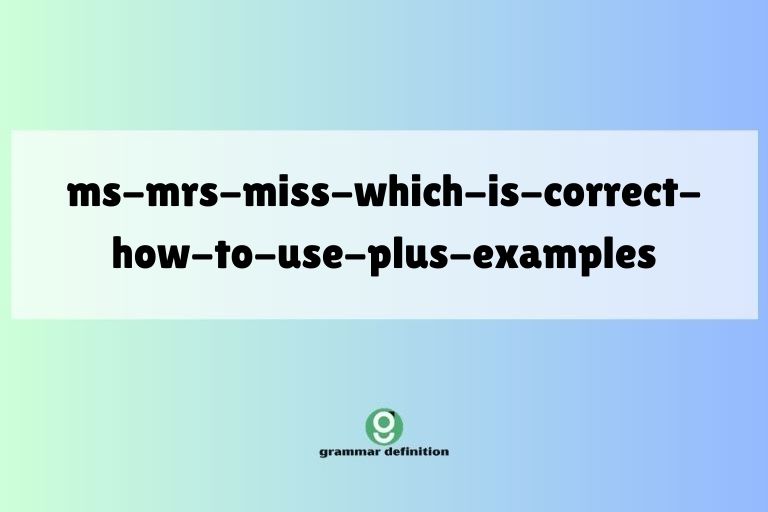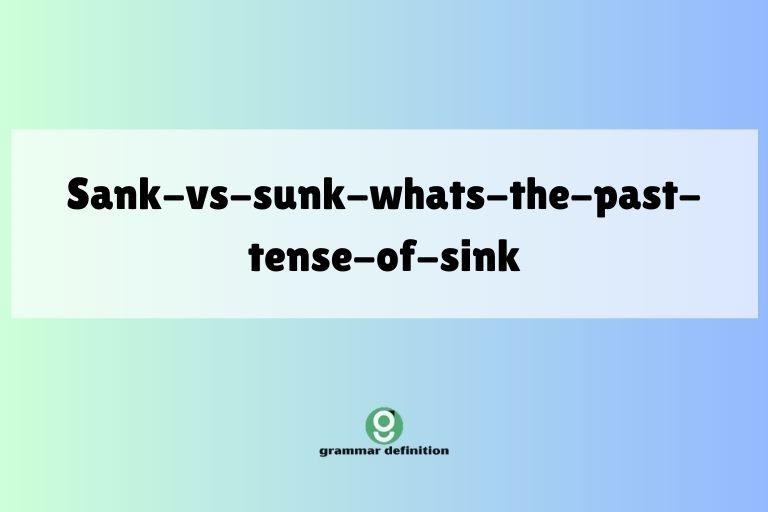Irregardless vs. Regardless: Which Word is Correct?
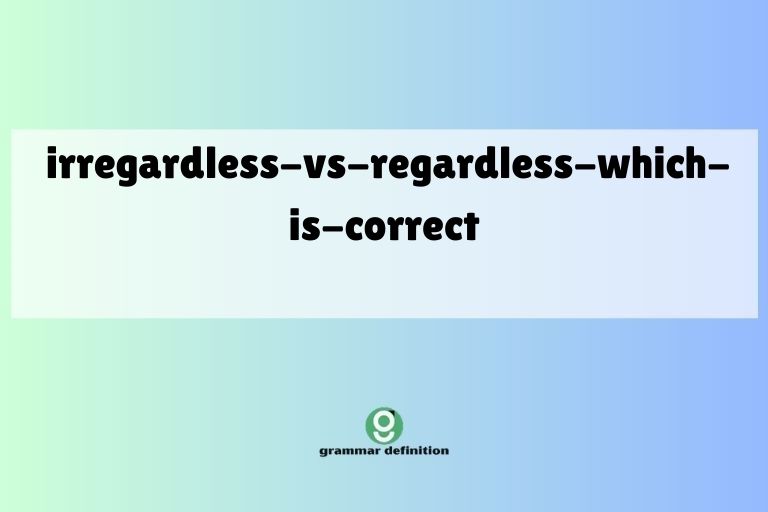
The English language is full of tricky words and phrases that can trip up even native speakers. One common point of confusion is the use of “irregardless” versus “regardless.” While “regardless” is a perfectly acceptable and widely used word, “irregardless” is generally considered nonstandard.
Understanding the difference and the reasons behind it is crucial for clear and effective communication. This article will explore the definitions, origins, and proper usage of both terms, providing you with the knowledge and tools to avoid this common grammatical pitfall.
Whether you’re an English language learner, a student, or simply someone who wants to improve their writing, this guide will help you master the correct usage of “regardless” and confidently avoid the error of using “irregardless.”
This article will provide a comprehensive overview of the topic, including definitions, structural breakdowns, usage rules, common mistakes, and practice exercises. By the end of this guide, you’ll have a solid understanding of why “irregardless” is considered incorrect and how to use “regardless” properly in various contexts.
Table of Contents
- Introduction
- Definitions: Irregardless vs. Regardless
- Structural Breakdown
- Origins of “Irregardless”
- Usage Rules: When to Use Regardless
- Examples of “Regardless” in Sentences
- Common Mistakes: Why “Irregardless” is Incorrect
- Alternatives to “Regardless”
- Practice Exercises
- Advanced Topics: Nuances of Usage
- Frequently Asked Questions (FAQ)
- Conclusion
Definitions: Irregardless vs. Regardless
To understand why one word is correct and the other is not, it’s essential to define each term.
- Regardless: This word means “without regard” or “despite something.” It implies that a particular action or decision will be taken without being affected by a certain factor or circumstance. It functions as an adverb or a preposition (in the phrase “regardless of”).
- Irregardless: This word is considered a nonstandard variant of “regardless.” Although it appears in some dictionaries, it is widely regarded as incorrect due to its redundant double negative. The prefix “ir-” already negates the root word, and adding “-less” creates a double negation, which cancels itself out, creating confusion and contradicting the intended meaning.
Structural Breakdown
A closer look at the structure of each word reveals the grammatical problem with “irregardless.”
Regardless Structure
“Regardless” is formed by combining the verb “regard” with the suffix “-less.” The suffix “-less” means “without,” so “regardless” literally means “without regard.” This word is grammatically sound and widely accepted.
Irregardless Structure: A Double Negative
“Irregardless” adds the prefix “ir-” to “regardless.” The prefix “ir-” is a negative prefix, similar to “in-” or “un-.” Therefore, “irregardless” attempts to create a double negative: “not without regard.” In standard English, a double negative typically cancels itself out, implying the opposite of what is intended. This makes the word illogical and confusing.
Origins of “Irregardless”
The word “irregardless” likely originated as a combination of “irrespective” and “regardless,” possibly through mishearing or misunderstanding. While it has appeared in print since the 19th century, its usage has consistently been criticized by grammarians and usage experts.
Its persistence is likely due to its perceived emphasis, even though that emphasis is grammatically incorrect.
Usage Rules: When to Use Regardless
The rule is simple: use “regardless” and avoid “irregardless.” Here’s how to use “regardless” correctly in different contexts.
General Usage
“Regardless” can be used in various contexts to indicate that something will happen or be done irrespective of certain circumstances. It is a versatile word that can add clarity and emphasis to your writing.
Formal Writing
In formal writing, such as academic papers, business reports, or legal documents, it is essential to use correct grammar and vocabulary. “Regardless” is the appropriate choice in these contexts.
Using “irregardless” would be considered a grammatical error and could detract from your credibility.
Informal Speech
While “irregardless” is sometimes used in informal speech, it is still generally considered nonstandard. Even in casual conversation, using “regardless” is preferable, as it demonstrates a command of proper English.
While some people may understand what you mean if you use “irregardless,” it’s best to avoid it altogether to prevent any potential confusion or negative judgment.
Examples of “Regardless” in Sentences
Here are some examples of how to use “regardless” correctly in sentences:
General Examples
The following table provides several examples of “regardless” used in general contexts. Each example is designed to illustrate the correct usage of the word in different sentence structures.
| Sentence | Explanation |
|---|---|
| We will proceed with the project regardless of the challenges we face. | This indicates that the project will continue, even if there are difficulties. |
| Regardless of the weather, the game will be played. | This means the game will happen whether it’s sunny, rainy, or snowy. |
| She is determined to succeed regardless of the obstacles in her path. | This shows her strong will to achieve her goals despite any difficulties. |
| The company is committed to quality regardless of the cost. | This highlights the company’s dedication to high standards, even if it’s expensive. |
| Regardless of his age, he continues to pursue his passions. | This emphasizes that his age doesn’t stop him from doing what he loves. |
| The law applies to everyone regardless of their social status. | This signifies that the law is equal for all, no matter their position. |
| Regardless of the outcome, we should be proud of our efforts. | This encourages a positive attitude, win or lose. |
| He always speaks his mind regardless of the consequences. | This shows his honesty and willingness to express his opinions. |
| The team worked hard regardless of the lack of resources. | This highlights their dedication despite having limited supplies. |
| Regardless of your opinion, I will make my own decision. | This asserts independence and the right to choose. |
| The show must go on regardless of any setbacks. | This emphasizes the importance of continuing the performance despite any challenges. |
| Regardless of the time, she always makes herself available for her friends. | This shows her commitment to her friends, no matter how busy she is. |
| The police will investigate the crime regardless of who is involved. | This indicates that the investigation will proceed impartially. |
| Regardless of how tired he is, he always finishes his work. | This highlights his strong work ethic and determination. |
| The company will continue to innovate regardless of market trends. | This shows their commitment to innovation, even if the market changes. |
| Regardless of the circumstances, honesty is always the best policy. | This emphasizes the importance of being truthful in all situations. |
| The doctor will provide treatment regardless of the patient’s ability to pay. | This highlights the doctor’s commitment to providing care to everyone. |
| Regardless of the risk, they decided to invest in the new venture. | This shows their willingness to take a chance despite potential losses. |
| The teacher is dedicated to helping every student succeed, regardless of their background. | This emphasizes the teacher’s commitment to equitable education. |
| Regardless of her own problems, she always finds time to help others. | This demonstrates her selflessness and compassion. |
Expressing Contrast
The following table illustrates the usage of “regardless” to express contrast, highlighting situations where something occurs despite an opposing factor.
| Sentence | Explanation |
|---|---|
| He felt tired, but he continued working regardless. | Despite feeling tired, he persisted with his work. |
| The price was high, but they bought it regardless. | Even though the price was expensive, they still made the purchase. |
| She knew it was risky, but she took the chance regardless. | Despite knowing the potential danger, she decided to proceed. |
| The task was difficult, but he completed it regardless. | Even though the task was challenging, he managed to finish it. |
| They were warned about the dangers, but they went ahead regardless. | Despite the warnings, they chose to continue their plan. |
| The store was closed, but they waited outside regardless. | Even though the store was not open, they remained there. |
| He was criticized for his decision, but he stood by it regardless. | Despite facing criticism, he maintained his position. |
| The odds were against them, but they fought on regardless. | Even though the chances of success were low, they continued to fight. |
| She had little experience, but she applied for the job regardless. | Despite her lack of experience, she still submitted an application. |
| The weather was terrible, but they had a picnic regardless. | Even though the weather was bad, they still had their picnic. |
| He didn’t have the right tools, but he tried to fix it regardless. | Despite not having the necessary equipment, he attempted to repair it. |
| The instructions were unclear, but she followed them regardless. | Even though the instructions were ambiguous, she still tried to follow them. |
| They knew it would be a long journey, but they started regardless. | Despite knowing the journey would be lengthy, they began it. |
| She had a headache, but she went to the party regardless. | Even though she had a headache, she still attended the party. |
| The project was behind schedule, but they kept working regardless. | Despite the project being delayed, they continued to work on it. |
| He was not feeling well, but he went to work regardless. | Even though he was unwell, he still went to work. |
| The car was old, but they drove it regardless. | Even though the car was old, they still drove it. |
| She was nervous, but she gave the presentation regardless. | Even though she was nervous, she still delivered the presentation. |
| The book was long, but he read it regardless. | Even though the book was lengthy, he still read it. |
| They were short on funds, but they continued the research regardless. | Even though they had limited money, they continued the research. |
Expressing Concession
The following table demonstrates the use of “regardless” to express concession, indicating acceptance of a situation while proceeding with an action.
| Sentence | Explanation |
|---|---|
| Regardless of the cost, the company will invest in new technology. | Even if it’s expensive, the company will still invest. |
| Regardless of the risk, he decided to climb the mountain. | Even though it’s risky, he still chose to climb. |
| Regardless of her fear, she sang on stage. | Even though she was afraid, she still sang. |
| Regardless of the criticism, he continued to paint. | Even though he received criticism, he still painted. |
| Regardless of the outcome, we gave it our best shot. | Even if we don’t succeed, we tried our hardest. |
| Regardless of the difficulty, they persevered. | Even though it was hard, they kept going. |
| Regardless of the rain, they went for a walk. | Even though it was raining, they still went for a walk. |
| Regardless of the delay, the package arrived safely. | Even though it was delayed, it still arrived safely. |
| Regardless of the confusion, they managed to complete the task. | Even though there was confusion, they still finished the task. |
| Regardless of the temptation, she stayed true to her principles. | Even though she was tempted, she remained honest. |
| Regardless of the competition, he pursued his dream. | Even though there was competition, he continued to chase his dream. |
| Regardless of the challenges, they built a successful business. | Even though there were challenges, they created a successful business. |
| Regardless of the past, he looked forward to the future. | Even though the past was difficult, he focused on the future. |
| Regardless of the rumors, she remained confident. | Even though there were rumors, she stayed confident. |
| Regardless of the setbacks, they never gave up. | Even though there were setbacks, they never quit. |
| Regardless of the doubts, he believed in himself. | Even though there were doubts, he had faith in himself. |
| Regardless of the pressure, she made the right decision. | Even though there was pressure, she made the correct choice. |
| Regardless of the uncertainties, they moved forward. | Even though there were uncertainties, they progressed. |
| Regardless of the limitations, they found a way to succeed. | Even though there were limitations, they found a path to success. |
| Regardless of the circumstances, they maintained their integrity. | Even though the circumstances were difficult, they remained honest. |
Common Mistakes: Why “Irregardless” is Incorrect
The most common mistake is using “irregardless” instead of “regardless.” Understanding why “irregardless” is incorrect is essential for avoiding this error.
The Problem with Double Negatives
As mentioned earlier, “irregardless” contains a double negative. The prefix “ir-” negates the meaning of “regardless,” which already contains the negative suffix “-less.” This double negation creates confusion because, in standard English, two negatives cancel each other out.
Therefore, “irregardless” unintentionally implies “with regard,” which is the opposite of what is intended.
Correct vs. Incorrect Examples
The following table provides examples of incorrect sentences using “irregardless” and their corrected versions using “regardless.”
| Incorrect Sentence | Correct Sentence |
|---|---|
| Irregardless of the weather, we will go for a walk. | Regardless of the weather, we will go for a walk. |
| Irregardless of his opinion, I will make my own decision. | Regardless of his opinion, I will make my own decision. |
| Irregardless of the cost, she bought the dress. | Regardless of the cost, she bought the dress. |
| Irregardless of the consequences, he spoke the truth. | Regardless of the consequences, he spoke the truth. |
| Irregardless of the difficulties, they completed the project. | Regardless of the difficulties, they completed the project. |
| Irregardless of how tired I am, I will finish this task. | Regardless of how tired I am, I will finish this task. |
| Irregardless of what people say, I will follow my dreams. | Regardless of what people say, I will follow my dreams. |
| Irregardless of the circumstances, honesty is the best policy. | Regardless of the circumstances, honesty is the best policy. |
| Irregardless of the risk, they decided to invest in the company. | Regardless of the risk, they decided to invest in the company. |
| Irregardless of the challenges, they remained optimistic. | Regardless of the challenges, they remained optimistic. |
| Irregardless of the time, he always made time for his family. | Regardless of the time, he always made time for his family. |
| Irregardless of the pressure, she made a wise decision. | Regardless of the pressure, she made a wise decision. |
| Irregardless of the outcome, they were proud of their efforts. | Regardless of the outcome, they were proud of their efforts. |
| Irregardless of the past, he was determined to succeed. | Regardless of the past, he was determined to succeed. |
| Irregardless of the obstacles, she achieved her goals. | Regardless of the obstacles, she achieved her goals. |
| Irregardless of the criticism, he continued to create art. | Regardless of the criticism, he continued to create art. |
| Irregardless of the circumstances, they maintained their integrity. | Regardless of the circumstances, they maintained their integrity. |
| Irregardless of the cost, they prioritized quality. | Regardless of the cost, they prioritized quality. |
| Irregardless of the danger, he rushed to help. | Regardless of the danger, he rushed to help. |
| Irregardless of the complexity, she solved the problem. | Regardless of the complexity, she solved the problem. |
Alternatives to “Regardless”
While “regardless” is a versatile word, there are situations where other words or phrases might be more appropriate. Here are some alternatives:
- Despite: Similar to “regardless of,” “despite” indicates that something happens even though there is an obstacle or opposing factor.
- In spite of: This phrase is synonymous with “despite” and can be used in the same way.
- Notwithstanding: A more formal alternative to “regardless of,” often used in legal or official contexts.
- Even though: This conjunction introduces a clause that presents a contrasting fact or situation.
- Although: Similar to “even though,” “although” introduces a contrasting clause.
- Irrespective of: This phrase is very similar in meaning to “regardless of” and is a good alternative.
Practice Exercises
Test your understanding of “irregardless” vs. “regardless” with these exercises.
Exercise 1: Choose the Correct Word
Choose the correct word (“regardless” or “irregardless”) to complete each sentence.
| Question | Answer |
|---|---|
| 1. ______ of the rain, we will still have the picnic. | Regardless |
| 2. ______ of your opinion, I will make my own decision. | Regardless |
| 3. She is determined to succeed, ______ of the obstacles. | Regardless |
| 4. The company will continue to innovate, ______ of market trends. | Regardless |
| 5. ______ of the cost, they decided to buy the house. | Regardless |
| 6. He always speaks his mind, ______ of the consequences. | Regardless |
| 7. The law applies to everyone, ______ of their social status. | Regardless |
| 8. We will proceed with the project, ______ of the challenges. | Regardless |
| 9. ______ of the outcome, we should be proud of our efforts. | Regardless |
| 10. She is committed to helping others, ______ of her own problems. | Regardless |
Exercise 2: Correct the Sentences
Correct the following sentences that incorrectly use “irregardless.”
| Incorrect Sentence | Corrected Sentence |
|---|---|
| 1. Irregardless of the price, I want to buy it. | Regardless of the price, I want to buy it. |
| 2. Irregardless of what he says, don’t believe him. | Regardless of what he says, don’t believe him. |
| 3. Irregardless of her age, she’s very active. | Regardless of her age, she’s very active. |
| 4. Irregardless of the danger, he went inside. | Regardless of the danger, he went inside. |
| 5. Irregardless of how you feel, you must do it. | Regardless of how you feel, you must do it. |
| 6. Irregardless of the circumstances, be honest. | Regardless of the circumstances, be honest. |
| 7. Irregardless of the risk, they invested the money. | Regardless of the risk, they invested the money. |
| 8. Irregardless of the time, he’s always late. | Regardless of the time, he’s always late. |
| 9. Irregardless of the criticism, she continued her work. | Regardless of the criticism, she continued her work. |
| 10. Irregardless of the difficulty, they finished the task. | Regardless of the difficulty, they finished the task. |
Exercise 3: Fill in the Blanks
Fill in the blanks with “regardless of” to complete the sentences.
| Sentence | Answer |
|---|---|
| 1. We will support you ______ your decision. | regardless of |
| 2. ______ the cost, they will proceed with the project. | Regardless of |
| 3. She is determined to succeed ______ the challenges. | regardless of |
| 4. They will continue their efforts ______ the obstacles. | regardless of |
| 5. ______ the weather, the event will take place. | Regardless of |
| 6. He made the right choice ______ the pressure. | regardless of |
| 7. ______ the outcome, they remained optimistic. | Regardless of |
| 8. She always helps others ______ her own needs. | regardless of |
| 9. ______ the risks, they moved forward with their plan. | Regardless of |
| 10. The company will invest in new technologies ______ the current market conditions. | regardless of |
Advanced Topics: Nuances of Usage
For advanced learners, it’s helpful to understand some of the finer points of using “regardless.”
Regardless of vs. Irrespective of
“Regardless of” and “irrespective of” are very similar in meaning and can often be used interchangeably. “Irrespective of” is generally considered more formal and is often used in legal or official contexts.
The key difference lies in their common usage and perceived formality, not in their core meaning.
Regardless as an Adverb
“Regardless” can function as an adverb, meaning “anyway” or “nevertheless.” In this usage, it often appears at the end of a sentence or clause, adding emphasis to the idea that something will happen despite other factors. For example: “It was raining, but they went for a walk regardless.”
Frequently Asked Questions (FAQ)
Here are some frequently asked questions about “irregardless” and “regardless.”
- Q: Is “irregardless” ever correct to use?
A: While “irregardless” might be found in some dictionaries as a nonstandard variant, it is almost universally considered incorrect in formal and standard English. Its use is generally discouraged because it is a double negative and therefore redundant.
- Q: Why do some people use “irregardless” if it’s incorrect?
A: Some people use “irregardless” because they believe it adds emphasis or because they are simply unaware that it is considered nonstandard. It may also be a result of mishearing or combining “irrespective” and “regardless.”
- Q: What is the origin of the word “irregardless”?
A: The word “irregardless” likely originated as a blend of “irrespective” and “regardless.” It has been in use since the 19th century, but has consistently been criticized by usage experts.
- Q: In what situations should I use “regardless”?
A: You should use “regardless” in any situation where you want to convey that something will happen or be done without being affected by a particular factor or circumstance. It is appropriate for both formal and informal contexts, although other alternatives may be preferred in some situations.
- Q: What are some alternatives to “regardless”?
A: Some alternatives to “regardless” include “despite,” “in spite of,” “notwithstanding,” “even though,” “although,” and “irrespective of.” The best choice will depend on the specific context and the desired level of formality.
- Q: How can I remember not to use “irregardless”?
A: A helpful way to remember not to use “irregardless” is to focus on its structure as a double negative. Remind yourself that the “ir-” prefix and the “-less” suffix both indicate negation, making the word redundant and illogical. Think of it as “regardless” already covers the meaning completely.
- Q: Is “regardless of” the same as “irrespective of”?
A: Yes, “regardless of” and “irrespective of” have very similar meanings and can often be used interchangeably. “Irrespective of” is generally considered more formal.
- Q: Can “regardless” be used at the end of a sentence?
A: Yes, “regardless” can be used as an adverb at the end of a sentence or clause to add emphasis, meaning “anyway” or “nevertheless.” For example: “It was a difficult task, but they tried regardless.”
Conclusion
Understanding the difference between “irregardless” and “regardless” is a simple but important aspect of mastering English grammar. While “regardless” is a perfectly acceptable and widely used word, “irregardless” is generally considered nonstandard and incorrect due to its redundant double negative.
By avoiding “irregardless” and using “regardless” appropriately, you can ensure that your writing and speech are clear, effective, and grammatically sound.
Remember to focus on the meaning of “regardless” as “without regard” or “despite something.” Practice using “regardless” in various contexts, and consider alternative words or phrases when appropriate. With a little attention to detail, you can confidently avoid the common mistake of using “irregardless” and enhance your overall command of the English language.
Keep practicing, and you’ll soon find that using “regardless” correctly becomes second nature.

